Anthropology and Law » książka
Anthropology and Law
ISBN-13: 9781571814241 / Angielski / Miękka / 2005 / 246 str.
Anthropology and Law
ISBN-13: 9781571814241 / Angielski / Miękka / 2005 / 246 str.
(netto: 129,58 VAT: 5%)
Najniższa cena z 30 dni: 135,22
ok. 22 dni roboczych.
Darmowa dostawa!
" . . . insightful and interesting . . . One hopes that the practical approach to how practitioners in anthropology and law can better connect with one another, as well as how both fields can connect with the rest of the (non-anthropological and non-legal) real world, is here to stay through Donovan and Anderson's insightful work." -PoLAR The relationship between Law and Anthropology can be considered as having been particularly intimate. In this book the authors defend their assertion that the two fields co-exist in a condition of "balanced reciprocity" wherein each makes important contributions to the successful practice and theory of the other. Anthropology, for example, offers a cross-culturally validated generic concept of "law," and clarifies other important legal concepts such as "religion" and "human rights." Law similarly illuminates key anthropological ideas such as the "social contract," and provides a uniquely valuable access point for the analysis of sociocultural systems. Legal practice renders a further important benefit to anthropology when it validates anthropological knowledge through the use of anthropologists as expert witnesses in the courtroom and the introduction of the "culture defense" against criminal charges. Although the actual relationship between anthropology and law today falls short of this idealized state of balanced reciprocity, the authors include historical and other data suggesting that that level of intimate cooperation draws ever closer. James M. Donovan received his anthropology doctorate from Tulane University. He also has degrees in Greek and Latin and Philosophy. He is Reference/Public Services Librarian at the University of Georgia School of Law Library. H. Edwin Anderson, III is an attorney practicing with a shipping company in Leer, Germany. He has a graduate degree in Latin American Studies from Tulane University and degrees in law from Tulane Law School, University of Bristol and University of Cape Town.
" . . . insightful and interesting . . . One hopes that the practical approach to how practitioners in anthropology and law can better connect with one another, as well as how both fields can connect with the rest of the (non-anthropological and non-legal) real world, is here to stay through Donovan and Andersons insightful work." -PoLARThe relationship between Law and Anthropology can be considered as having been particularly intimate. In this book the authors defend their assertion that the two fields co-exist in a condition of "balanced reciprocity" wherein each makes important contributions to the successful practice and theory of the other. Anthropology, for example, offers a cross-culturally validated generic concept of "law," and clarifies other important legal concepts such as "religion" and "human rights." Law similarly illuminates key anthropological ideas such as the "social contract," and provides a uniquely valuable access point for the analysis of sociocultural systems. Legal practice renders a further important benefit to anthropology when it validates anthropological knowledge through the use of anthropologists as expert witnesses in the courtroom and the introduction of the "culture defense" against criminal charges.Although the actual relationship between anthropology and law today falls short of this idealized state of balanced reciprocity, the authors include historical and other data suggesting that that level of intimate cooperation draws ever closer.James M. Donovan received his anthropology doctorate from Tulane University. He also has degrees in Greek and Latin and Philosophy. He is Reference/Public Services Librarian at the University of Georgia School of Law Library. H. Edwin Anderson, III is an attorney practicing with a shipping company in Leer, Germany. He has a graduate degree in Latin American Studies from Tulane University and degrees in law from Tulane Law School, University of Bristol and University of Cape Town.











